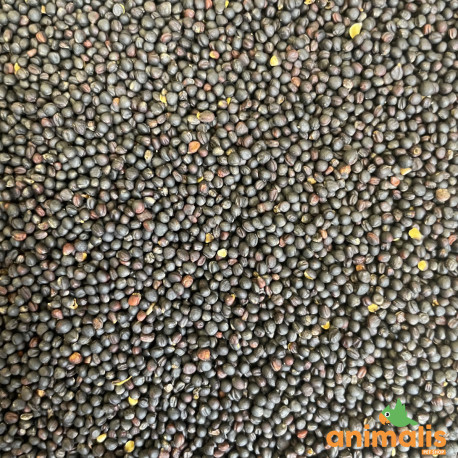



Reference: COLZA-KG
These seeds rich in lipids and proteins are especially appreciated by wild birds. They will attract sizerins, reeds, goldfinches, black-headed chickadees, sparrows, sad doves and a host of other birds to your garden. It is often used as a replacement for the more expensive shuttle.
These seeds rich in lipids and proteins are especially appreciated by wild birds. They will attract sizerins, reeds, goldfinches, black-headed chickadees, sparrows, sad doves and a host of other birds to your garden. It is often used as a replacement for the more expensive shuttle.
Clover stimulates the immune system and slows down cellular ageing through its excellent antioxidant properties. Rich in vitamins B, C, E and provitamin A.
Striated sunflower is the basic seed of any parrot mixture. It is also used in mixtures for parakeets and exotic doves.
It is also the favorite food of your outdoor birds during the winter period! Ideal for feeding the birds in your garden.
Practical information for giving sunflower seeds to birds in your garden:
Remember to regularly clean the feeders of your outdoor birds so that diseases and bacteria do not thrive.
Also consider setting feeders high up to prevent predators (such as cats, foxes, etc.) from targeting birds when they are eating.
Flaxseed is rich in omega 3, which is essential for the cardiovascular system.
Turnip is almost similar to rapeseed, the difference is the more bitter flavor of the latter. Turnip seed is rich in protein and favourable to the improvement of song, so it is interesting during the breeding season in canaries.
A type of seed with a mild taste and high protein content. They are also high in fat.
This seed is quite fatty, we advise you not to exceed 10% of your shuttle mix for colored canaries or posture canaries.
For singing canaries, the shuttle softens the song and can therefore be used at 30% of the mixture: in the latter case, we advise you to accompany your bird's diet with liver support.
Birds like to remove the shells from peanuts and then eat the peanuts. Peanuts are a source of energy, which is very important for the long winter months.
Unpeeled peanuts can be given to parrots as a treat.
Extra wheat, very good quality, for all types of birds and ornamental animals, pigeons, chickens, parrots, parakeets, doves...
Thanks to its small black or pretty electric blue seeds, the poppy is recognizable among thousands. A cousin of the poppy, the poppy is known for its content of good fats and micronutrients essential for the proper functioning of the body.
The flaxseed consists of 40 to 45% oil and 25% protein. Flaxseed preserves very well. It contains, in particular, two fatty acids with similar names (both derived from the word "lin"), linolenic acid (an omega-3) and linoleic acid.
The seed is used in animal feed, particularly for laying hens for which an increase in the omega-3 content of the eggs is desired.
Due to these properties, this seed aids digestion.
Dari, also known as sorghum, millet, is a variety of seeds that is attached to millet varieties. The dari has the size of the hemp seed. The seed is native to the warm regions of Australia, Asia, Africa and South America. There are three varieties: white, yellow and red-brown dari. It should be noted that light dari is given more value than red-brown dari. As far as the food value in particular is concerned, there is not the slightest difference. In addition, the red-brown dari is well appreciated by agapornis. Dari can be compared to wheat in terms of starch content. The seed has a favorable composition of amino acids. The protein present in the dari has a particularly high leucine content.
Niger, birdseed rich in phosphorus and calcium. Niger seeds (or nyjer seeds) are fine seeds rich in oil. They come from Guizotia abyssinica (also known as Guizotia oleiferous). The niger is highly prized by most birds, goldfinches and siskins love it.
The seed is mainly grown in India, Burma, Ethiopia and Nepal. Niger is an oilseed with a high fat content (38-43%) and protein content (23%). It provides quality food for all species of wild and forest birds, both in dry and sprouted form.
Niger is one of the few birdseeds with a good ratio of calcium to phosphorus.
This seed from switchgrass is rich in protein (12.6%) it also contains 60% carbohydrates and less than 5% fat.
It is the richest variety of millet in protein. Japanese millet is recommended to all breeders of exotics, natives, parakeets, large parakeets.
Millet is used in the diet of all birds: straight beaks and hooked beaks. In clusters, it's a delicacy they love.
Millet in clusters has a good protein and carbohydrate content and it also contains a large number of amino acids. Ideal to distract your birds and thus avoid pecking (pulling feathers).
We advised to give red millet for exotic birds. It is richer in protein than yellow millet.

These seeds rich in lipids and proteins are especially appreciated by wild birds. They will attract sizerins, reeds, goldfinches, black-headed chickadees, sparrows, sad doves and a host of other birds to your garden. It is often used as a replacement for the more expensive shuttle.
